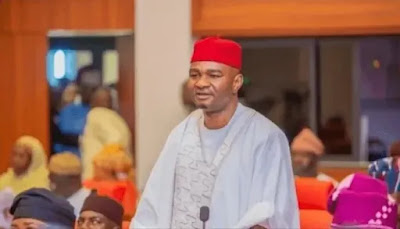In a scandal that has rattled the Nigerian political landscape, Senator Onyekachi Nwaebonyi, the Deputy Chief Whip of the Senate, is under fire for making inflammatory comments about fellow lawmaker, Senator Natasha Akpoti-Uduaghan. His statements, made during a recent televised interview, have drawn widespread criticism and sparked intense public discourse about misogyny, political ethics, and the treatment of women in Nigerian governance.
The Controversial Statement
During the controversial interview, Senator Nwaebonyi alleged that Senator Natasha Akpoti-Uduaghan had six children from six different men. He also dismissed her recent claims of sexual harassment against Senate President Godswill Akpabio, asserting that her accusations were fabricated and politically motivated. According to Nwaebonyi, he was present during the encounter at Akpabio’s residence in December 2023 and claimed that no misconduct took place.
These assertions, viewed by many as a character assassination attempt, have since ignited backlash from women’s rights advocates, political observers, and members of the public. Critics argue that Nwaebonyi's comments were not only unverified but also a deliberate attempt to discredit a female colleague by attacking her personal life.
Akpoti-Uduaghan’s Sexual Harassment Allegations
Senator Natasha Akpoti-Uduaghan, representing Kogi Central, had earlier accused Senate President Akpabio of making inappropriate advances during an official visit to his residence. She alleged that she was subjected to harassment and made to feel unsafe in what was meant to be a professional and respectful setting. Her allegations were met with mixed reactions within the Senate, with some calling for an investigation while others, including Nwaebonyi, dismissed her claims outright.
Escalating the Controversy
Further fueling the controversy, Nwaebonyi accused Akpoti-Uduaghan of a pattern of similar allegations against other high-profile figures, including former Kogi State Governor Yahaya Bello and former presidential aide Reno Omokri. He implied that her claims against Akpabio were consistent with a broader strategy of targeting powerful men for personal or political gain.
This narrative has been met with resistance, especially from civil society groups and supporters of Senator Akpoti-Uduaghan, who argue that the senator's history of advocacy and transparency should not be weaponized against her. Rather than focusing on her private life, critics insist the focus should be on the veracity of her allegations and the need for a fair investigation.
Dispute Over Her Family Life
Nwaebonyi’s claim that Senator Natasha has six children with six different men was swiftly challenged. Sources close to the senator clarified that she has four children from three different relationships. They emphasized that her personal life should not be used as a political tool to undermine her credibility, particularly in relation to the serious claims she has made.
The issue has sparked a broader conversation around the use of personal attacks in politics, especially those targeting women. Many see Nwaebonyi’s remarks as an attempt to shame Akpoti-Uduaghan and shift the narrative away from the sexual harassment allegations that deserve institutional attention.
Senate’s Response and Public Reaction
In the wake of these developments, the Senate reportedly suspended Senator Akpoti-Uduaghan for six months—a move that has raised further concerns about gender bias and the silencing of women in politics. Human rights groups and gender equality advocates have condemned the suspension as unjust and a discouraging precedent for female politicians who might face similar experiences.
Public opinion has been divided. While some Nigerians support Nwaebonyi's defense of Senate leadership, many others view the senator’s statements as irresponsible and damaging—not only to Natasha’s reputation but to the credibility of the Senate as a whole.
Implications for Gender Equality in Nigerian Politics
This incident has reignited discussions about the hostile environment women face in Nigerian politics. From personal attacks to institutional silencing, female lawmakers often navigate a political space fraught with double standards and systemic barriers. Akpoti-Uduaghan’s situation is seen by many as a classic case of victim-blaming and character assassination—a tactic often used to deter women from seeking justice or positions of power.
The political climate, already tense, is now grappling with questions about whether enough is being done to protect whistleblowers, especially when allegations involve senior figures in government. There are growing calls for the Senate to establish independent mechanisms for investigating harassment claims and holding individuals accountable, regardless of their rank or gender.
A Turning Point?
For some, this controversy may represent a turning point in the struggle for gender equity in Nigerian politics. Senator Natasha’s courage in coming forward, despite the risk of public humiliation and political backlash, has earned her praise from women’s rights advocates and progressives who believe this moment could trigger long-needed reforms.
Meanwhile, Senator Nwaebonyi is facing increasing pressure to retract his statements and issue an apology. Advocacy groups are demanding accountability and warning that unchecked rhetoric like his contributes to a toxic political culture that discourages victims from speaking out.
Conclusion
As the dust continues to settle around this explosive controversy, the Nigerian public and political class are left grappling with difficult questions. Should personal lives be used as weapons in political discourse? How can institutions better support victims of harassment? And what does justice look like for a female lawmaker who dares to challenge the status quo?
Regardless of how the story unfolds, the fallout from Nwaebonyi’s remarks has underscored the urgent need for respectful dialogue, institutional accountability, and a renewed commitment to gender equity in Nigerian politics.


Post a Comment
0Comments